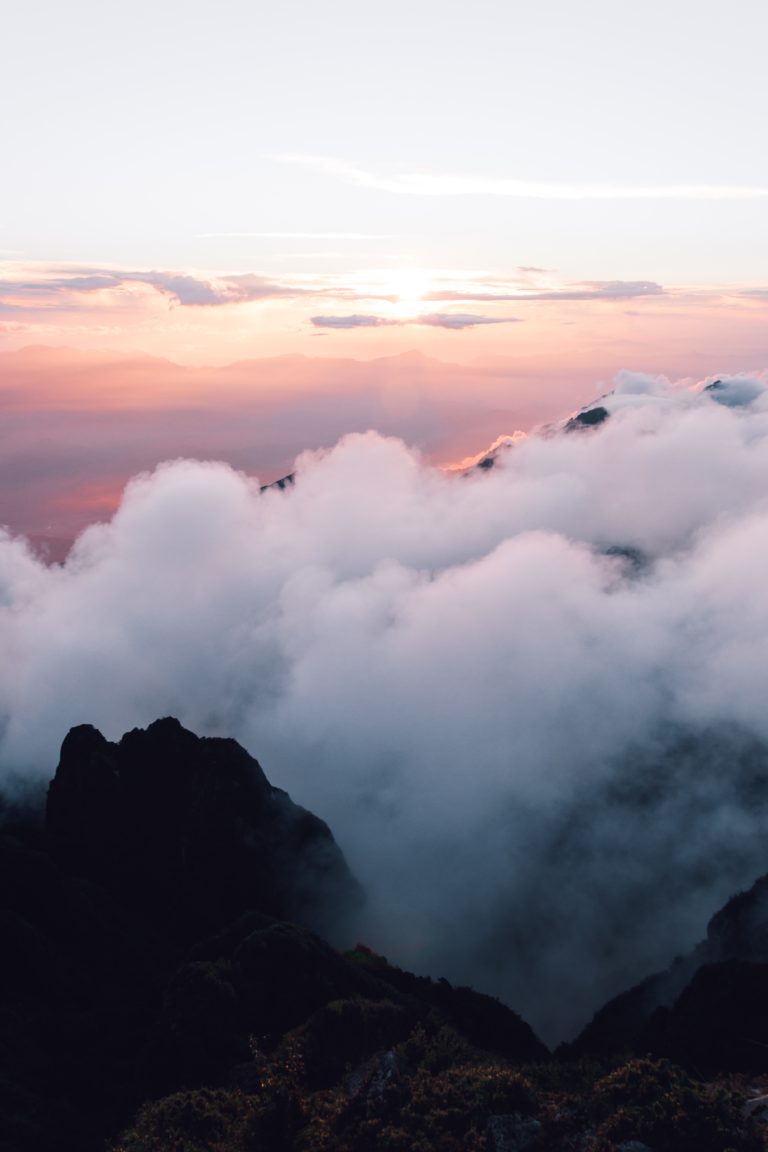
Image by Andreas Kind/Unsplash, Public Domain Dedication (CC0).
We Need Courage, Not Hope, to Face Climate Change
As a climate scientist, I am often asked to talk about hope. Particularly in the current political climate, audiences want to be told that everything will be all right in the end. And, unfortunately, I have a deep-seated need to be liked and a natural tendency to optimism that leads me to accept more speaking invitations than is good for me. Climate change is bleak, the organizers always say. Tell us a happy story. Give us hope. The problem is, I don’t have any.
I used to believe there was hope in science. The fact that we know anything at all is a miracle. For some reason, the whole world is hung on a skeleton made of physics. I found comfort in this structure, in the knowledge that buried under layers of greenery and dirt lies something universal. It is something to know how to cut away the flesh of existence and see the clean white bones underneath. All of us obey the same laws, whether we know them or not.
Look closely, however, and the structure of physics dissolves into uncertainty. We live in a statistical world, in a limit where we experience only one of many possible outcomes. Our clumsy senses perceive only gross aggregates, blind to the roiling chaos underneath. We are limited in our ability to see the underlying stimuli that, en masse, create an event. Temperature, for example, is a state created by the random motions of millions of tiny molecules. We feel heat or cold, not the motion of any individual molecule. When something is heated up, its tiny constituent parts move faster, increasing its internal energy. They do not move at the same speed; some are quick, others slow. But there are billions of them, and in the aggregate their speed dictates their temperature.
The internal energy of molecule motion is turned outward in the form of electromagnetic radiation. Light comes in different flavors. What we see occupies a tiny portion of a vast electromagnetic spectrum. Light is a wave, of sorts, and the distance between its peaks and troughs determines the energy it carries. Cold, low-energy objects emit stretched waves with long, lazy intervals between peaks. Hot objects radiate at shorter wavelengths.
To have a temperature is to shed light into your surroundings. You have one. The light you give off is invisible to the naked eye. You are shining all the same, incandescent with the power of a hundred-watt bulb. The planet on which you live is illuminated by the visible light of the sun and radiates infrared light to the blackness of space. There is nothing that does not have a temperature. Cold space itself is illuminated by the afterglow of the Big Bang. Even black holes radiate, lit by the strangeness of quantum mechanics. There is nowhere from which light cannot escape.
The same laws that flood the world with light dictate the behavior of a carbon dioxide molecule in the atmosphere. CO2 is transparent to the Sun’s rays. But the planet’s infrared outflow hits a molecule in just such as way as to set it in motion. Carbon dioxide dances when hit by a quantum of such light, arresting the light on its path to space. When the dance stops, the quantum is released back to the atmosphere from which it came. No one feels the consequences of this individual catch-and-release, but the net result of many little dances is an increase in the temperature of the planet. More CO2 molecules mean a warmer atmosphere and a warmer planet. Warm seas fuel hurricanes, warm air bloats with water vapor, the rising sea encroaches on the land. The consequences of tiny random acts echo throughout the world.
I understand the physical world because, at some level, I understand the behavior of every small thing. I know how to assemble a coarse aggregate from the sum of multiple tiny motions. Individual molecules, water droplets, parcels of air, quanta of light: their random movements merge to yield a predictable and understandable whole. But physics is unable to explain the whole of the world in which I live. The planet teems with other people: seven billion fellow damaged creatures. We come together and break apart, seldom adding up to an coherent, predictable whole.
I have lived a fortunate, charmed, loved life. This means I have infinite, gullible faith in the goodness of the individual. But I have none whatsoever in the collective. How else can it be that the sum total of so many tiny acts of kindness is a world incapable of stopping something so eminently stoppable? California burns. Islands and coastlines are smashed by hurricanes. At night the stars are washed out by city lights and the world is illuminated by the flickering ugliness of reality television. We burn coal and oil and gas, heedless of the consequences.
Our laws are changeable and shifting; the laws of physics are fixed. Change is already underway; individual worries and sacrifices have not slowed it. Hope is a creature of privilege: we know that things will be lost, but it is comforting to believe that others will bear the brunt of it.
We are the lucky ones who suffer little tragedies unmoored from the brutality of history. Our loved ones are taken from us one by one through accident or illness, not wholesale by war or natural disaster. But the scale of climate change engulfs even the most fortunate. There is now no weather we haven’t touched, no wilderness immune from our encroaching pressure. The world we once knew is never coming back.
I have no hope that these changes can be reversed. We are inevitably sending our children to live on an unfamiliar planet. But the opposite of hope is not despair. It is grief. Even while resolving to limit the damage, we can mourn. And here, the sheer scale of the problem provides a perverse comfort: we are in this together. The swiftness of the change, its scale and inevitability, binds us into one, broken hearts trapped together under a warming atmosphere.
We need courage, not hope. Grief, after all, is the cost of being alive. We are all fated to live lives shot through with sadness, and are not worth less for it. Courage is the resolve to do well without the assurance of a happy ending. Little molecules, random in their movement, add together to a coherent whole. Little lives do not. But here we are, together on a planet radiating ever more into space where there is no darkness, only light we cannot see.
